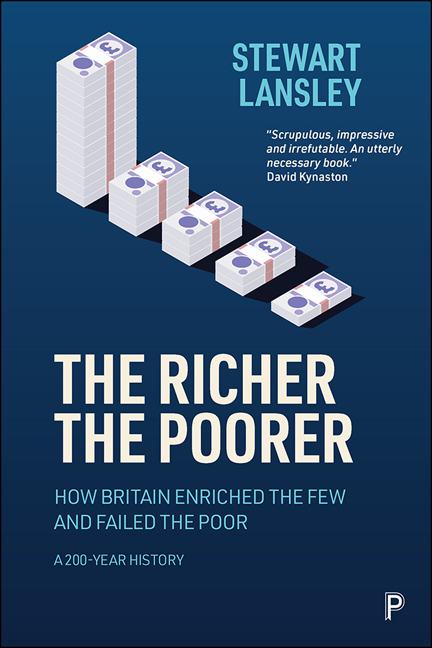Book contents
- Frontmatter
- Miscellaneous Frontmatter
- Dedication
- Epigraph
- Contents
- List of figures
- Preface and acknowledgements
- Introduction: Knighthoods for the rich, penalties for the poor
- PART I 1800–1939
- PART II 1940–59
- PART III 1960–79
- PART IV 1980–96
- PART V 1997–2010
- PART VI 2011–20
- Afterword: COVID-19 and ‘the polo season’
- Notes
- Index
- Frontmatter
- Miscellaneous Frontmatter
- Dedication
- Epigraph
- Contents
- List of figures
- Preface and acknowledgements
- Introduction: Knighthoods for the rich, penalties for the poor
- PART I 1800–1939
- PART II 1940–59
- PART III 1960–79
- PART IV 1980–96
- PART V 1997–2010
- PART VI 2011–20
- Afterword: COVID-19 and ‘the polo season’
- Notes
- Index
Summary
The war on benefits was a key part of the government's wider economic strategy. To tackle the post-2008 recession, Labour had boosted public investment and made a temporary cut in the VAT rate. By the general election in 2010, the economy was in modest recovery, though with a sharp rise in the budget deficit, the gap between public spending and tax revenue.
Folklore economics
Labour's declared plan, if lacking in detail, was to halve the budget gap over the next five years. In contrast to Labour's strategy that recovery and job creation was the best way of meeting rising debt, the new chancellor, George Osborne, slammed on the brakes. Claiming that the economic crisis had been caused by Labour's profligate social spending and excessive state borrowing, he launched, as Robert Chote, then director of the IFS, described it, ‘the longest, deepest, sustained period of cuts to public services spending at least since the Second World War’.
The year 2010 was hardly a time for playing politics with a still weak economy, yet, by rejecting Labour's mild Keynesianism, Osborne turned to the balanced budget theory of the 1930s, imposing severe fiscal deflation at a time of a deep deficit of demand. This was a controversial strategy that clashed with majority economic opinion. It made attempts to jumpstart recovery almost entirely dependent on a new form of monetary policy called quantitative easing –to pump liquidity into the economy –alongside attempts to boost property prices. The strategy came with profound distributional consequences, and was described by Robert Skidelsky as ‘folklore economics’. One critic, David Blanchflower, a former member of the Bank of England's Monetary Policy Committee, concluded that, by destroying productive capacity and making households worse off, the austerity programme simply ‘crushed the fragile recovery’. According to one estimate, austerity reduced the size of the economy by L100 billion pounds by the end of the decade.
Central to the policy of retrenchment –another instalment in the live experiment in market economics –was a ‘big-bang’ package of benefit reforms. By 2019, close to L40 billion had been shorn from the annual working-age benefit budget.
- Type
- Chapter
- Information
- The Richer, the PoorerHow Britain Enriched the Few and Failed the Poor: A 200-Year History, pp. 216 - 223Publisher: Bristol University PressPrint publication year: 2021



